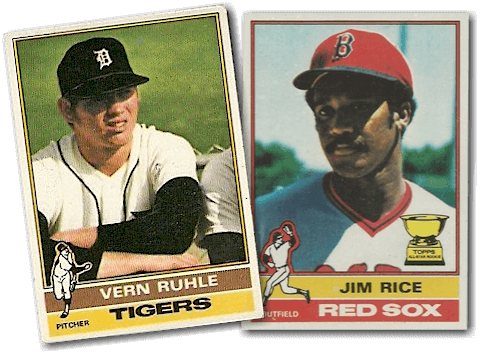
A pitch by Vern Ruhle late in the 1975 season broke Jim Rice’s hand and possibly changed baseball history.
In 1975, the Detroit Tigers franchise completely bottomed out.
Sure, there were still some aging veterans such as Gates Brown, Bill Freehan, Willie Horton, John Hiller, Mickey Lolich, and Mickey Stanley.
The Tigers, however, had to endure the growing pains of unproven kids like Danny Meyer, Tom Veryzer, Leon Roberts, Fernando Arroyo, Bob Molinaro, and Chuck Scrivener.
All you need to know about the ’75 Tigers was that Aurelio Rodriguez, a fine third baseman and a decent hitter, led all position players with 1.9 Wins Above Replacement.
The 1968 world championship was a distant memory, and the post-Kaline era was off to a horrible start.
Still, one member of those ’75 Tigers may have altered not only the course of that year’s postseason, but of baseball history.
It started out innocuously enough. The date was September 21, a Sunday. Detroit was playing the final game of the year at Tiger Stadium before heading to Baltimore and Milwaukee to close out the schedule.
The Tigers were mired in last place in the American League East, with a record of 57-97, 34 games off the pace. Division-leading Boston was set to face Detroit that afternoon in the rubber match of a three-game set.
Detroit was playing the role of spoiler, since the result had plenty of bearing on the Red Sox’ hopes. This was game number 155 for both clubs; with a 3½-game lead on second-place Baltimore, Boston had yet to clinch.
Detroit’s skipper Ralph Houk sent right-hander Vern Ruhle to the mound. A former 17th-round pick, Ruhle was a native of Coleman, Michigan, and had attended Olivet College. At 24, he was in his first full big-league campaign. He brought a record of 11-11 with a 3.92 ERA into this, his 30th start. There was no reason to think this outing woould be anything special or noteworthy.
Ruhle breezed through the opening inning, despite giving up a Denny Doyle double. The Tigers got on the scoreboard in the first on Ron LeFlore’s two-base hit and an RBI single by Gary Sutherland.
Then came the inning that may have changed the fortunes of the 1975 Red Sox, and perhaps Boston franchise history.
Leading off was Jim Rice, the 22-year-old left fielder who had paired with Fred Lynn to give Boston one of the greatest rookie combinations in history. The right-handed hitting Rice was batting .309 with 22 home runs and 109 ribbies. Rice was already a fearsome sight to opposing pitchers in the American League.
Ruhle threw an inside fastball that hit Rice on the left hand. The Sox slugger stayed in the game, however, and scored later in the inning on a sacrifice fly by Rico Petrocelli. Rice batted again in the third, drew a walk, and was caught stealing. He popped out in the sixth, but the pain in his hand was too much, and Dwight Evans replaced him in left field in the bottom of the seventh.
The Red Sox won the battle that afternoon, 4-1, but they had lost the war. X-rays taken afterward at Detroit’s Henry Ford Hospital revealed that Rice had broken the fourth metacarpal bone in his left hand. He walked out of the hospital with the hand in a cast and a sullen disposition. The Sox made the grim announcement that the rookie star would be lost for the remaining few games of the season, as well as all of the postseason.
Only 9,059 bothered to show up for that final game of the season at Tiger Stadium. It also featured Gates Brown’s last career at-bat in front of the home folks, a pinch-hit walk. That, however, is another story.
The Sox took three of their next five to win the division by 4½ lengths. A cloud hung over the celebration: The mood on the team, and in Red Sox Nation, was that Rice’s injury was a crushing blow. As for Detroit, they dropped their remaining games to finish with an abysmal 57-102 mark.
Vern Ruhle pitched two more years for the Tigers before moving on to the Houston Astros, Cleveland Indians, and California Angels. A winner of 67 games (and loser of 88) in his 13-year career, he later became a successful pitching coach for several teams. With Houston he was the pitching coach for a team that won three consecutive division titles from 1997-99. He died in 2007 at age 55 after battling cancer for a year. Rice, of course, went into the Hall of Fame.
Despite a nondescript pitcher career, Ruhle may have single-handedly denied the Red Sox a chance at a long-elusive world title.
Minus Rice, Boston swept the heavily favored Oakland A’s in the American League Championship Series in 1975. They went on to face the Cincinnati Reds in a classic World Series, only to lose in seven hard-fought games.
Would the presence of Rice in the lineup have put the Red Sox in a better position to win their first World Series since 1918? Many of the players on that Boston team are convinced that, with Rice, they would have taken down Sparky Anderson’s Big Red Machine in ’75.
For that, the Reds should thank an unremarkable Tigers pitcher named Vern Ruhle.


